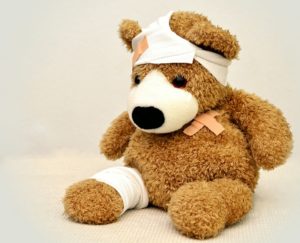About twenty years ago, I had arthroscopic surgery on my knee. I was running a lot, and over a period of a couple of months, my right knee began talking to me. A trip to my doctor ended up with a referral to an orthopedic surgeon, and not knowing any better, I let him operate without much diagnostic assessment (this is pure 20/20 hindsight).
 Everything I had heard about arthroscopic knee surgery was that it was a piece of cake, and that I would be back running in two weeks. The surgery happened, the knee actually needed nothing (it was “pristine” in the words of the surgeon), and I was left to recover on my own. Despite all I had been told about recovering from this kind of surgery, it took me six months of pain, physical therapy, and frustration before I was able to run even a few steps.
Everything I had heard about arthroscopic knee surgery was that it was a piece of cake, and that I would be back running in two weeks. The surgery happened, the knee actually needed nothing (it was “pristine” in the words of the surgeon), and I was left to recover on my own. Despite all I had been told about recovering from this kind of surgery, it took me six months of pain, physical therapy, and frustration before I was able to run even a few steps.
I learned several painful lessons from that surgery, and one was that despite the expectations of your medical team, friends, and well-wishers, the time it takes to heal from trauma or surgery varies a great deal from person to person. There are a number of factors that can influence healing time, including:
-Your overall health. If you’re run down, have poor immunity, or have some other health condition, it can take longer for you to heal than say, a healthy twenty-year old.
-The amount of trauma involved in your injury. A dentist once told me that how quickly a person heals from a tooth extraction is directly related to how difficult it was to pull the tooth. This is true of any kind of trauma. A bad accident or complicated surgery takes some serious healing time.
-Your level of pain. The bottom line is it is incredibly difficult to heal when you’re in a lot of pain. It’s harder to move, eat, and sleep—all of which are needed to recover.
-Your mindset. It can be hard to keep your head in the game if your quality of life is diminished by pain and immobility, but a sense of calm and optimism about your condition can help considerably with the healing process. Being motivated to get yourself up and moving around and knowing that eventually you will heal can work like a tonic.
-Diet. Your body is using a lot of energy to heal itself. Help fuel the process by giving it what it needs. Stay hydrated and eat light proteins, whole grains, and lots of plant-based foods. Your body will thank you.
-Other forms of self-care. Other therapies, like massage and physical therapy can be beneficial while you’re healing, and this is where acupuncture comes in. A few sessions on the acupuncture table can help reduce your pain, improve your sleep and alleviate stress associated with your recovery. Most major hospitals in the US offer acupuncture for in-patients and some even offer it in their emergency rooms.
So, what was the deal with my six month knee ordeal? My theory is that when the surgeon didn’t find anything wrong with it, he went on a fishing expedition to try to find the source of my pain. The additional trauma associated with his “exploration” made a simple surgery more traumatic. The aftermath came with a lot of pain and swelling, poor range of motion, and overall loss of mobility. The good news is that now my knee is fully functional and pain free, and I have learned to ask a lot more questions before agreeing to surgery, and that there are no standard time tables for healing.




NIce sharing great blog it contains lot of information which is very helpful for us this blog is very interesting and informative also i really enjoyed this blog thanks for sharing.